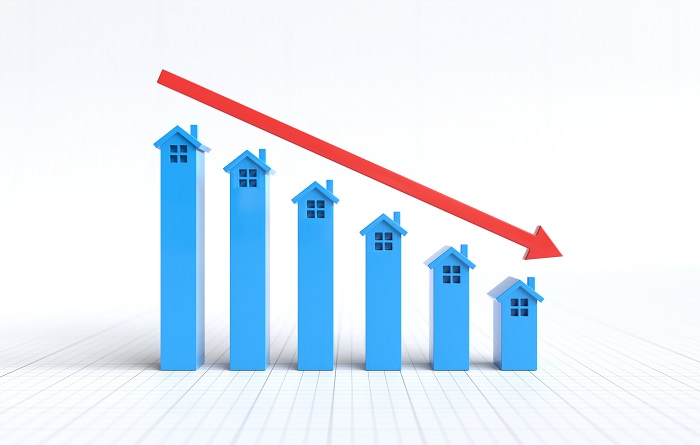Making predictions about the UK housing market can be a tricky business, as the last few years have shown us quite dramatically. From the heady days of the pandemic house price boom of 2020-2022 to the more recent downturn in market activity (estimated to be 10-30% lower than pre-pandemic figures) as the pressure of rising inflation on affordability mounted, there have been many factors affecting house price growth – or lack thereof.
As we reach the end of 2023, many prospective vendors and homebuyers will be interested to know where the housing market is headed and the impact this will have on the value of our own homes.
What has happened to house prices in 2023?
Following a year of rising inflation in 2022 (with a peak of 11.1% in October 2022), a buoyant housing market began to feel the impact of interest rates, and concurrently our mortgage rates also climbed steadily. This would continue into 2023, as the UK housing market saw a significant dip in house price growth in the first six months of the year and the first annual decline (of 1.1%) in house prices since June 2020 was experienced in February 2023. By the end of the third quarter, year-on-year house prices had decreased further to -5.3% in September 2023.
Despite the Bank of England’s decision to maintain the base rate at 5.25%in both Septemberand November 2023 after 14 consecutive rate rises since December 2021, and the modest month on month growth in house prices which was seen in October and November 2023, industry insiders such as Jones Lang LaSalle (JLL) and Lloyds Bank anticipate that we will still end the year with an overall drop in house prices of around 3-7%.
So, what of 2024?
What are the forecasts for house prices in 2024?
The forecast for UK house prices in 2024 shows a varied outlook. Whilst,encouragingly, the rate ofaverage earnings growth now exceeds the rate of inflation, suggesting a reduction to our cost of living pressures, consumer confidence is still low. This juxtaposition has led topredictions of both positive and negative house price growthas we can see from the key insights and predictions from industry leaders below.
Savills UK:
Savills predicted a decline in house prices by 3% in 2024. They expect the base rate to remain at its current peak well into 2024. However, with a potential rate cut in the second half of the year, they feel that there could be room for growth, with a projected 5-year growth figure of 17.9%.
Zoopla:
Zoopla’s forecast suggests a 2% drop in UK house prices over 2024. This prediction is attributed to high mortgage rates and expensive housing by historical standards. They also note that if house prices continue to fall and incomes increase, or if mortgage rates decrease, it could improve affordability for home buyers, potentially supporting sales.
Office for Budget Responsibility (OBR):
According to the OBR, house costs are supposed to grow by a modest 0.9% by the end of 2023, followed by a significant decrease of 4.7% in 2024. This decrease would align with the average UK house price reaching around £266,000 at its lowest point.
Lloyds Bank:
The country’s largest mortgage lender forecasts a 4.7% fall in average property prices over 2023 and an additional 2.4% decrease over 2024. However, there is an expectation of recovery in 2025.
Pantheon Macroeconomics:
Contrasting with other forecasts, Pantheon Macroeconomics predicts a strong rebound in UK house prices in 2024, estimating a 5% increase. This optimistic outlook is based on the expectation of falling mortgage costs and improved household balance sheets.
Rightmove:
Rightmove forecasts a 1% dip in average new seller asking prices by the end of 2024 as the disparity between supply and demand diminishes. In 2023, they have reported a 10% decrease in the number of sales being agreed in comparison to the pre-pandemic market of 2019 along with price reductions for nearly 40% of properties marketed on the site, up 10% in comparison to 2022.
These varying predictions reflect the complex nature of the housing market, influenced by factors such as mortgage rates, economic conditions, and changes in buyer affordability. As these contrasting forecasts show, the exact trajectory of the housing market can often be uncertain. Vendors are therefore advised to seek an accurate valuation of their property to ensure they set a realistic asking price and avoid a protracted sale process as buyers continue to remain cautious.
Image by user6702303 on Freepik





No Comment! Be the first one.